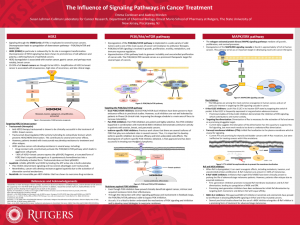Cordover, Emma: The Influence of Signaling Pathways in Cancer Treatment
Title: The Influence of Signaling Pathways in Cancer Treatment
Name: Emma Cordover
Major: Genetics
School affiliation: School of Arts and Sciences
Programs: Honors College with Johnson & Johnson Women in STEM2D Life Sciences Summer Undergraduate Research Fellowship (HCW-SURF)
Other contributors: Audrey Minden
Abstract: This summer, I worked on a review article about the influence of signaling pathways in cancer treatment. Cancer is driven by mutations and the dysregulation of pathways that cause uncontrollable cellular proliferation. The focus of this presentation is on the role of HER2 and the PI3K/mTOR/Akt and MAPK/ERK signaling pathways in cancer therapies. The dysregulation of HER2, most notable for its overexpression in breast cancer, causes the overactivation of the PI3K/Akt/mTOR and MAPK/ERK cascades, contributing to oncogenesis. Even though there are several anti-HER2 therapeutic approaches that have proved beneficial against cancer, many HER2-positive breast cancer patients relapse. Further, the PI3K/mTOR/Akt pathway is implicated in a wide variety of tumors and is one of the main causes of cancer cell resistance to antitumor therapies. PI3K signaling modulates mTOR which regulates cell growth and metabolic processes. There are several agents that target PI3K, but resistance proves to be a problem in current treatments. Lastly, dysregulation of the MAPK/ERK signaling cascade is found in approximately ⅓ of all human cancers and leads to the progression and proliferation of cancer cells. Current therapeutics target Ras, Raf, and MEK, the main effectors of ERK signaling.
